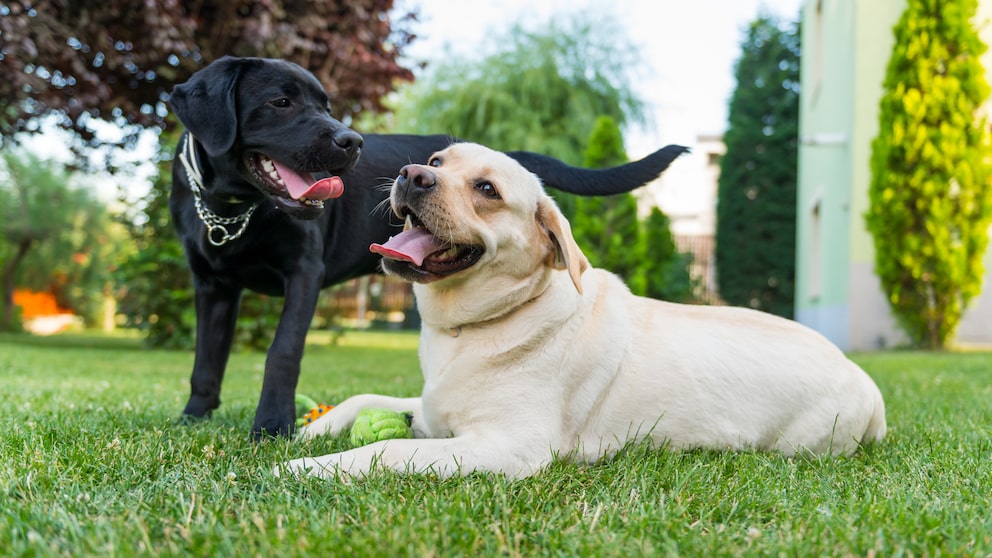March 11, 2025, 9:36 am | Read time: 5 minutes
Male or female dog? Most owners ask themselves this question before a dog moves in with them. Many have a clear preference as to which sex their new pet should be. But are there really demonstrable differences in character between males and females?
Do male dogs behave differently than female dogs? This is a question that many dog owners ask themselves and one that is hotly debated on social networks. In a viral video on TikTok, for example, dog trainer Andrea Stelzig explains: “Yes, I would agree that a female dog tends to be more easily led than a male dog.” Of course, there are exceptions, but in general, female dogs tend to be more submissive and emotional and have a greater desire to please their owners. Meanwhile, males are often stronger and generally chummier. But is this really the case?
Traditional Gender Roles Can Influence Cohabitation with Humans
In an interview with PETBOOK, dog psychologist Marc Ebersbach explains that we need to take a more nuanced view. “Of course, we have to fall back on the social understanding of the sexes. So, the female dog is responsible for rearing the puppies and has a high social component. On the other hand, we have the male dog, who is responsible for protection and territory defense. In other words, we have a division of roles here, which can, of course, also be transferred to living together with humans.”
It is, therefore, fair to say that female dogs generally have a greater social understanding, while male dogs are generally more self-confident and can often be “a bit rougher,” says the expert. However, Ebersbach emphasizes that a distinction must also be made here between the character of the dog and the typical breed characteristics.
“Females of One Breed May Even Be More Assertive Than Males of Another Breed”
“Of course, there are differences. I know male dogs that are overly sensitive and whiny and female dogs that exhibit bold and courageous personalities. Then suddenly their personality comes into play again, regardless of their gender.” Then, of course, there are special breed characteristics. “There are dogs that are simply more offensive or more defensive. In other words, we can now say, okay, the females of one breed are perhaps even more aggressive than the males of another breed.”
This is an observation that dog trainer Andrea Stelzig also shares. “There are two breeds where, in my experience, the difference between male and female dogs is massive. In no other breed have I noticed this as much as with the Magyar Vizsla and the Weimaraner. Especially with the Vizsla, the difference between male and female is really massive.” Vizsla bitches are often very submissive, sensitive, affectionate, and have a great desire to please. Male dogs, on the other hand, are dominant and strong and show great assertiveness.
Understanding Behavioral Tendencies
The observation with the Vizsla “has a bit to do with the fact that Vizslas are very sensitive dogs anyway, and you can now experience this sensitivity even more pronounced in the bitches,” says Marc Ebersbach. “If we assume a stereotypical Vizsla, which is a very sensitive dog anyway, then we can say that the bitches tend to act even more sensitively compared to other breeds than perhaps the bitches of other breeds.”
But here, too, it must be said that these are tendencies — just like the tendency for males to be more affectionate than females. In addition, male dogs can often remain playful into old age, which, of course, also applies to some female dogs. Another tendency often described by owners and trainers is that female dogs are often more cautious when playing with human children than male dogs. The latter are often described more as good “roughhousing buddies” for the human offspring.1 “These are tendencies, and tendencies can be observed. But they are not rigid, fixed norms,” explains Marc Ebersbach.

Dog psychologist Dog Psychologist Would Advise Everyone to Spend the Bight in Nature with Their Dog

Frequently Asked Questions Why Do Dogs from the Same Household Often Die in Quick Succession?

Dog trainer explains Why most dog trainers on TV are male
Mental Health Also Plays a Role in Canine Behavior
However, there is another component that should not be neglected when considering whether there really are differences in character between male and female dogs. And that is the mental health of the animals. “Everything I have already described relates to the normal behavior of dogs. That is when dogs basically have no psychological stress, and they can show their normal behavior in a normal environment, in normal social interaction,” explains Ebersbach.
On the other hand, there are dogs that have to deal with psychological issues. “For example, a male dog that is not mentally stressed may be much more chilled than a female dog that is mentally stressed.” But why are there so many contradictory observations and descriptions from dog owners in forums and comment columns? It’s probably because it’s important not to lose sight of the big picture. Various factors such as upbringing, socialization, breed, and individual personality play a role in a dog’s behavior.
Although certain tendencies may differentiate male and female dogs in character, each dog is an individual. Personal experience and upbringing often have a greater influence than gender alone. For this reason, it is not always possible to tell whether a dog is male or female by its behavior.

